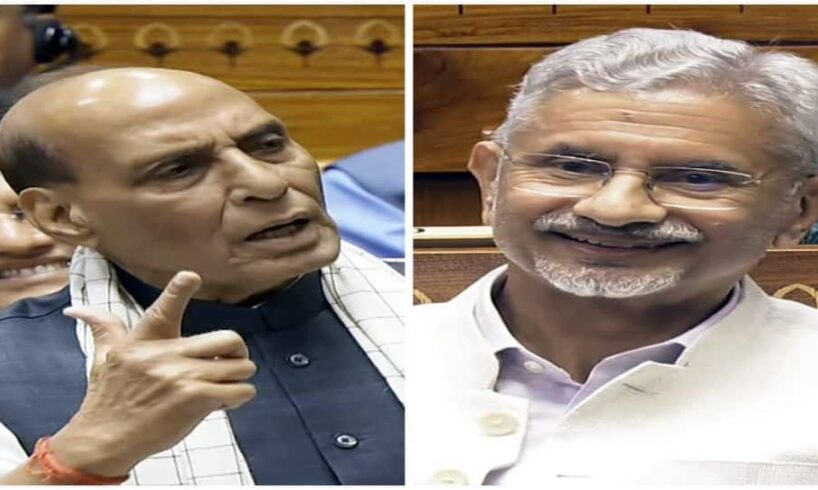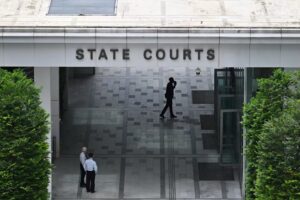
New Delhi: The Lok Sabha turned into a fiery arena on Monday over Operation Sindoor, India’s covert military response to the April 22 terror attack in Pahalgam. The offensive killed 26 people. Parliamentary proceedings revealed a spectacular shift in India’s counter‑terrorism posture and triggered clashes across party lines.
External Affairs Minister S. Jaishankar opened the debate with a bold proclamation on India’s new doctrine against terror. “The challenge of cross-border terrorism continues but Operation Sindoor marks a new phase. There is now a new normal,” he said.
He outlined a structured five‑point framework: “The new normal has five points. One, terrorists will not be treated as proxies. Two, cross‑border terrorism will get an appropriate response. Three, terror and talks are not possible together. There will only be talks on terror. Four, not yielding to nuclear blackmail. And finally, terror and good neighbourliness cannot coexist. Blood and water cannot flow together. This is our position.”
Highlighting that Pakistan had crossed “red lines” with the Pahalgam attack, Jaishankar emphasised India’s strategic diplomacy.
“It was important to send a clear, strong and resolute message after the Pahalgam attack. Our red lines had been crossed, and we had to make it very apparent that there would be serious consequences as a result,” he said.
He emphasised the twin objectives that shaped the response: “All of this was aimed at these two objectives – zero tolerance of terrorism and the right to defend ourselves, the right to defend the people of India against the cross-border terrorism.”
He addressed the post‑attack diplomacy focus. “The focus for our diplomacy was the UN Security Council. The challenge for us was that at this particular point, Pakistan is a member of the Security Council and we (India) are not (at that time)…,” he said.
He noted India’s dual goals at the UN: “Our goals in the Security Council were two: 1, to get an endorsement from the Security Council of the need for accountability, and 2, to bring to justice those who perpetrated this attack.”
He celebrated India’s success in securing support: “I am glad to say that if you look at the Security Council statement of 25th April, the members of the Security Council condemned in the strongest terms the terrorist attack. They affirmed that terrorism in all its forms and manifestations constitutes one of the most serious threats to international peace and security.”
Jaishankar firmly dismissed claims of external mediation. “At no stage, in any conversation with the United States, was there any linkage with trade and what was going on,” he claimed.
He clarified high‑level diplomacy. “There was no call between Prime Minister Narendra Modi and US President Donald Trump from April 22 to June 17. The prime minister, in his response, made it very clear that if such an attack happens, it would meet with an appropriate response from us.
“That attack took place and was foiled by our armed forces, and I think the House should collectively appreciate the performance of the armed forces in foiling what was a massive attack on the 9th and 10th of May. Our response, which the prime minister promised, was delivered, and it was delivered with devastating effect.
“I do not have to say anything. Every member has seen satellite pictures of Pakistani airfields. You can see from the state of those airfields, which is shown by the pictures, what our answer was.”
Jaishankar also took aim at the Congress over China policy: “Some mention was made about visits, including my visit. Yes, I went to China. I went to China to make our position very clear about de-escalation, about trade restrictions and about terrorism. I did not go to China for the Olympics, I did not go to China for secret agreements.
“The House should know that people were watching Olympics when China was issuing stapled visas to people from Arunachal and Jammu and Kashmir. This is the reality of China. Let me really tell you how is the relation with China. We heard about warning about China, caution about China and you know China is planning this and China is planning that. Sir, I want to remind this House.”
He recalled the Doklam crisis episode and said, “Doklam crisis was on. The Leader of Opposition decided to get a briefing from whom? Not from the Government, not from the MEA, but from the Chinese Ambassador. He took his briefing from the Chinese Ambassador when our military was confronting the Chinese military in Doklam.”
He moved on to critique past Congress policies: “What is the economic thinking of the Congress Party about China? In 2006, the Congress Party agreed to do a regional trading arrangement with China. It was finalised during the visit of President Hu Jintao. A task force was appointed. The task force gave a positive recommendation. Through the efforts of various people, this did not happen. Let me give you the technology side. The very people today who are cautioning us on China are the people who allowed 3G and 4G to come from China. It was this Government which made sure that there was a Made in India 5G.”
He underlined border infrastructure upgrades: “We keep speaking about the border. The border today, whether it is border with Pakistan or border with China or any other border. If our military is today able to stand its ground, the kind of massive deployment that we saw on the China border after 2020, it is because our border infrastructure budget has gone up four times, our tunnelling, our road building, our bridge building has doubled or tripled.
“And this is a far cry from the period the thinking was let us not develop the border because then the Chinese cannot come in. We had 60 years of the neglect of the border. Today in last 10 years, that neglect has been reversed. There is still a lot of work to be done. So I think people need to understand, and its not just in India.”
He touted diplomatic wins in neighbouring states. “We have just come back from Maldives. When I hear comments about foreign policy, day before yesterday, the PM was the Guest of Honour at the Independence Day of Maldives. This is the country which during their time forced an Indian company to leave an airport. That country has today invited India to build two new airports.
“Look at Sri Lanka. If the Hambantota port was built between 2005 and 2008 and at that time it was actually justified that it has no impact on India’s interest. I want the House to appreciate that the people who are claiming today to be the custodians of national security thinking, who say that they are giving warnings, let us look at their record, let us see what they did when they were in office.”
He praised parliamentary outreach: “In many cases the Foreign Minister of the country met them. These seven delegations, the delegations led by Ravi Shankar Prasad ji, by Shashi Tharoor ji, by Baijayant Panda ji, by Sanjay Kumar Jha ji, by Kanimozhi ji, by Supriya Sule ji and by Srikant Eknath Shinde ji – these seven delegations did the nation proud. Across the board and every member, members of opposition, members of the Government, public spirited citizens, retired diplomats, they were able to explain to the whole world our posture of zero tolerance against terrorism.”
He urged unity. “We can only succeed in ensuring Zero Tolerance against Terrorism if we have a united voice in this country against terrorism. There must not be any division of opinion on this matter. The way the parliamentary delegations behaved abroad, I hope the same solidarity will permeate the proceedings of the House,” he concluded.
Defence Minister Rajnath Singh followed, detailing the May operation and its implications.
“On 10th May, when the Indian Air Force struck hard at multiple airfields in Pakistan, Pakistan admitted defeat (Pakistan ne haar maan li) and offered to cease hostilities. They spoke to our DGMO and asked to stop… This offer was accepted with the caveat that this Operation has only been paused. If any misadventure occurs from Pakistan’s side in the future, this Operation will be resumed,” he said.
He restated: “The offer was accepted with the caveat that the operation was only paused, and if there was any future misadventure on the part of Pakistan, it would lead to the resumption of the operation. The attacks by the Indian Air Force, strong retaliation by the Indian Army along the LoC and the fear of Naval attacks forced Pakistan to surrender. And this defeat of Pakistan was not simply a failure, but a defeat of its military strength and morale.”
He framed the operation’s purpose: “The objective of Operation Sindoor was not to cross the border or capture the territory, it was to eliminate terror nurseries which Pakistan had nurtured for years, and provide justice to the innocent families who lost their loved ones in cross‑border attacks.”
He condemned terrorism: “Pakistan‑sponsored terrorism as not ‘Random Madness’, but a ‘well‑planned strategy’ and a ‘fundamental rage’.”
He affirmed India’s resolve: “Those who provide shelter and support to terrorism will not be spared. India is not going to bow down to any kind of nuclear blackmailing or other pressures.”
He described the Pahalgam attack as the worst: “The Pahalgam terrorist attack on April 22, 2025, when 26 innocent people, including a Nepali citizen, were killed on the basis of their religion, as the vilest example of inhumanity, which tested the limits of India’s tolerance.”
He outlined troop action dates: “On May 6 and 7, 2025, the Indian Armed Forces launched Operation Sindoor, which was not just a military action, but an effective and decisive demonstration of the Government’s responsibility towards India’s sovereignty, its identity & the people of the country, as well as its policy against terrorism. Our military leadership not only showed its maturity but also demonstrated the strategic wisdom which is expected from a responsible power like India.”
He described operational planning: “There were a number of options on the table, but we chose the option in which the terrorists and their hideouts suffered maximum damage and the common citizens of Pakistan did not suffer any harm.
“According to an estimate, over 100 terrorists, their trainers, handlers and associates were killed in well‑coordinated strikes by our forces at nine terror infrastructure targets in Pakistan and PoK with precision. Most of the terrorists belonged to organisations like Jaish‑e‑Mohammed, Lashkar‑e‑Taiba and Hizbul Mujahideen, which have the open support of Pakistan Army and ISI. Our action was completely in self‑defence. It was neither provocative nor expansionist.”
He recounted Pakistan’s retaliation: “On May 10, Pakistan used missiles, drones, rockets and other long‑range weapons on India, in addition to technologies related to electronic warfare, on a large scale, targeting Indian Air Force bases, Indian Army ammunition depots, airports and military cantonments. Our security system was foolproof and every attack was foiled. Pakistan was unable to hit any of the Indian targets and none of the important assets were damaged.”
He praised the precision: “The Indian Air Force targeted Pakistan’s airbases, Command and Control centers, Military infrastructures, and Air Defense Systems on the Western Front, and the mission was successfully accomplished. Our retaliatory attack was swift, proportionate and precise.”
He reiterated no casualties: “The Indian armed forces only targeted those who were continuously involved in trying to attack India while supporting terrorists. The objective was never to wage war but to compel the adversary to bow down through demonstrative use of force,” he said, asserting that none of soldiers suffered any casualties during the operation.
He reconfirmed pause conditions: “When the Indian Air Force struck heavy blows on multiple Pakistani airfields, Pakistan conceded defeat and offered to cease hostilities. The offer was accepted with the caveat that the operation was only paused, and if there was any future misadventure on the part of Pakistan, it would lead to the resumption of the operation.”
He explained diplomatic contact: “On May 10, the DGMO of Pakistan contacted the DGMO of India & appealed to halt the military operations, and after formal talks on May 12 between the two DGMOs, both sides decided to put a halt to the operations.”
He mentioned his border visit: “Our soldiers are not only protecting the borders, but also safeguarding our national self‑respect.”
He celebrated tri‑services coordination: “The Indian Navy gave a clear message to Pakistan that we are not only capable but also ready to attack their every important base, from sea to land.”
He rejected premature claims of pressure: “Rejecting the claims that the operation was stopped under pressure, Singh termed them as ‘baseless and incorrect’. He stated that India halted the action as all the political and military objectives were fully achieved. He reiterated that Operation Sindoor has only been halted, and not ended.”
He issued a warning: “If Pakistan again tries to carry out any nefarious act, we are fully prepared for an even more intense and decisive action.”
He spoke on policy: “Under PM Modi’s leadership, India does not tolerate, it responds and the Government is committed to completely eradicate terrorism in all its forms and manifestations.”
He reiterated stance on talk vs terror: “Terrorism and talks cannot go together. Talks are carried out between civilised, democratic countries. But, a nation which does not have even an iota of democracy in its existence and only has religious fanaticism, terrorism and hatred against India, dialogue cannot take place…”
He accused Pakistan: “Pakistan is the nursery of global terrorism and it has made the menace the basis of its state policy. It arranged State Funeral for the terrorists, which was attended by military officers.”
He condemned Pakistan tactics: “Pakistan cannot muster the courage to fight the soldiers on the border, so it makes innocent civilians, children and pilgrims the target of terrorism. Its Army and ISI use terrorism as a proxy war, and they dream of destabilising India. Those who dream to give India a thousand cuts must never forget that this is the New India led by PM Modi, which can go to any extent against terrorism.”
He clarified India’s position: “India has never occupied even an inch of anyone’s land, and it does not believe in competing with a country like Pakistan, which is nowhere near in size, strength, power and prosperity.”
He framed conflict ideology: “India’s conflict with Pakistan is not a border conflict but the one of civilisation versus barbarism. The leaders of Pakistan know that their soldiers cannot defeat India in the battlefield so they nurture terrorism while portraying themselves as innocents in front of the whole world. Pakistan used terrorism as a toolkit which is in opposition to the civilised code of conduct that the rest of the world prefers to abide by.”
He underscored ideological war: “India’s fight against terrorism is being fought on the ideological front, and not only on the border.”
He thanked delegations: “He expressed gratitude to all the delegations which presented, on global forums, India’s zero tolerance policy against terrorism and Operation Sindoor. He acknowledged the fact that political parties kept aside their ideologies and differences and showed solidarity with the nation, the soldiers and the government.”
He concluded: “The Government, the Armed Forces and democratic institutions are committed to taking every step necessary for the unity, integrity and security of the nation.”





